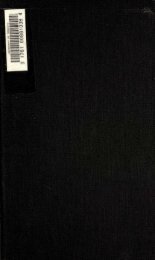Texts from the Buddhist canon : commonly known as Dhammapada
Texts from the Buddhist canon : commonly known as Dhammapada
Texts from the Buddhist canon : commonly known as Dhammapada
Create successful ePaper yourself
Turn your PDF publications into a flip-book with our unique Google optimized e-Paper software.
ii6 DHAMMAPADA.<br />
a tree, who conversed toge<strong>the</strong>r thus : " What think you is<br />
<strong>the</strong> greatest misery to bear in all <strong>the</strong> world ? '<br />
" One said<br />
<strong>the</strong> greatest misery in <strong>the</strong> world is lust ; ano<strong>the</strong>r said <strong>the</strong><br />
greatest misery is hunger and thirst ; ano<strong>the</strong>r said it w<strong>as</strong><br />
anger ; ano<strong>the</strong>r said it w<strong>as</strong> fear. Whilst <strong>the</strong>y were thus<br />
disputing, without any hope of agreement, Buddha, know-<br />
ing' <strong>the</strong> c<strong>as</strong>e, transported himself to <strong>the</strong> spot, and inquired<br />
what <strong>the</strong>ir disputation w<strong>as</strong> about. On this <strong>the</strong> Bhikshus,<br />
having arisen and paid him homage, explained how <strong>the</strong><br />
c<strong>as</strong>e stood. On this <strong>the</strong> World-honoured explained that<br />
<strong>the</strong>y had not got to <strong>the</strong> bottoni of <strong>the</strong> matter, but that<br />
<strong>the</strong> body itself w<strong>as</strong> <strong>the</strong> greatest misery, for <strong>from</strong> <strong>the</strong> body<br />
come§ <strong>the</strong> misery of hunger and thirst, cold and heat,<br />
anger, and pride, and lust ; and <strong>the</strong>refore our aim should<br />
be to get rid of <strong>the</strong> body, and thus attain <strong>the</strong> perfect rest<br />
of Nirvlna. And <strong>the</strong>n he added <strong>the</strong>se stanz<strong>as</strong> :<br />
" There ^ is no burning greater than lust ; <strong>the</strong>re<br />
is no distress (poison) worse than hate ; <strong>the</strong>re is<br />
no misery greater than this body ; <strong>the</strong>re is no joy<br />
like (its) destruction. Without accordance <strong>the</strong>re<br />
can be little joy ; small power of distinguishing<br />
truth argues little wisdom ; by perceiving and<br />
seeking for that which is truly great, by this means<br />
alone one obtains perfect rest. Now I, <strong>the</strong> Honored<br />
of <strong>the</strong> World, fully explain <strong>the</strong> character of<br />
<strong>the</strong> sorrowless; I fully (am able) to deliver <strong>the</strong><br />
three worlds ; I alone (or by myself alone) have<br />
overthrown <strong>the</strong> whole army of M4ra (<strong>the</strong> devil)."<br />
Having uttered <strong>the</strong>se words, Buddha explained how<br />
that in ages gone by <strong>the</strong>re w<strong>as</strong> a certain Bhikshu pos-<br />
sessed of <strong>the</strong> five supernatural powers (iddhi), who dwelt<br />
in <strong>the</strong> mountains under a tree, practising austerities with<br />
1 Compare ver. 202 of <strong>the</strong> PMi.<br />
—





